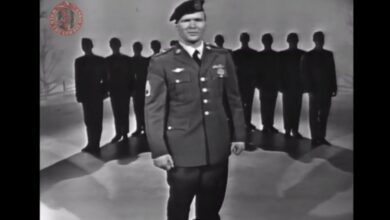Freddy Wrote This Song In 1956, But It Took Until The 70s To Shine. You Did It, Freddy!
Freddy Fender, born Baldemar Garza Huerta on June 4, 1937, in San Benito, Texas, is a prominent figure in the landscape of American music. His Mexican heritage deeply influenced his musical style, allowing him to blend the vibrant cultures of both Mexican and American music. This unique combination of traditional Mexican elements, country influences, and the emerging rock and roll scene of the late 1950s and early 1960s gave rise to Fender’s distinctive sound, which resonated with a diverse audience and highlighted his ability to adapt in a continually changing musical environment.
From a young age, Fender was passionate about music, learning to play the guitar and performing at community events. Initially, he recorded under various pseudonyms, but his early work largely went overlooked. His poignant song “Wasted Days and Wasted Nights,” written and recorded in 1959, addressed deeply personal themes of loss and regret, yet it failed to gain the recognition it deserved upon release. Fender’s promising career took an unfortunate turn when legal troubles led to his arrest for marijuana possession, a setback that challenged him both personally and professionally.
The early 1970s, however, marked a turning point for Fender. After serving his time, he returned to the music scene with renewed vigor. His breakthrough came in 1974 with the release of “Before the Next Teardrop Falls,” which quickly climbed the charts. Its heartfelt lyrics and Fender’s rich baritone voice struck a chord with listeners, appealing not just to country fans but also to those who loved Tejano music and beyond. This success was pivotal in helping him regain his place in the industry and set the stage for a remarkable resurgence in his career.
In 1975, capitalizing on his newfound popularity, Fender revisited “Wasted Days and Wasted Nights,” re-recording it with a fresh, polished production that highlighted his signature style. This updated version soared to the top of the Billboard Country charts and endeared him to many listeners. This reinvention showcased Fender’s ability to blend musical styles while capturing universal themes of love, loss, and longing—reflecting his artistic prowess and the evolution of his career.
Through the late 1970s and into the 1980s, Fender continued to thrive in the music industry, releasing multiple hit records and collaborating with various artists. He became a crucial link between Tejano and mainstream country music, paving the way for future generations of musicians who wished to explore the rich cultural intersections of their own heritages. His command of language and knack for conveying powerful emotional stories allowed him to transcend cultural boundaries, resonating with listeners from all walks of life.
Fender received numerous accolades throughout his career, underscoring his influence and contributions to music. His induction into the Texas Country Music Hall of Fame in 2002 highlighted his lasting impact on the genres he helped to shape. His musical legacy extends beyond mere chart success; it strikes a deep chord with fans who relate to the themes of love, resilience, and cultural pride in his songs—serving as a national anthem for the Mexican-American community and celebrating their experiences.
Later in life, despite health struggles, Fender remained dedicated to his music. His warmth and charm endeared him to fans, who appreciated not only his talents but also his humble nature. His ability to connect with audiences and foster relationships at his performances became a hallmark of his career. His commitment inspired many, showcasing how music can create bonds and provide comfort during challenging times. Fender’s genuine interactions with his fans reflected his belief in music’s unifying power.
Freddy Fender passed away on October 14, 2006, leaving a profound legacy of musical artistry. His iconic hits, including “Wasted Days and Wasted Nights” and “Before the Next Teardrop Falls,” still resonate with listeners today, ensuring that his voice maintains a crucial presence in American music. The narratives woven into his songs continue to connect with audiences, embodying themes of perseverance and hope that characterized his personal journey and the broader challenges faced by many artists.
Fender’s life story and musical journey represent a compelling narrative of resilience and triumph in overcoming adversity. His legacy not only commemorates his artistic contributions but also inspires countless individuals to pursue their passions. His experiences resonate across generations, reinforcing the idea that creativity can flourish even amidst life’s challenges. Through his music, Fender invites new audiences to delve into the heartfelt stories and rich cultural narratives that define the Tex-Mex sound he masterfully created. His enduring spirit serves as an inspiration to both artists and fans alike, encouraging them to embrace their heritage while celebrating the universal themes of love and determination that transcend boundaries.





